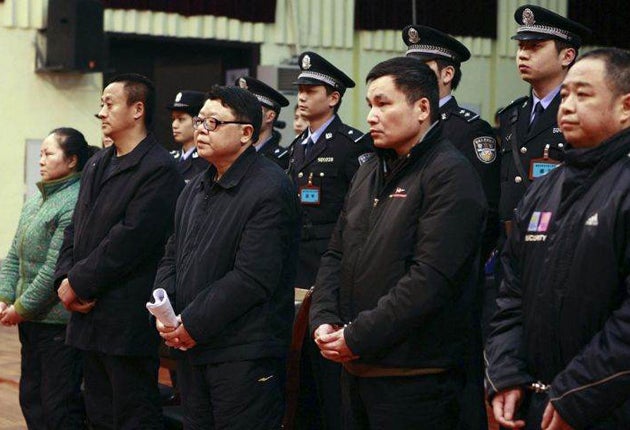China vows to curtail rampant corruption in government

Your support helps us to tell the story
From reproductive rights to climate change to Big Tech, The Independent is on the ground when the story is developing. Whether it's investigating the financials of Elon Musk's pro-Trump PAC or producing our latest documentary, 'The A Word', which shines a light on the American women fighting for reproductive rights, we know how important it is to parse out the facts from the messaging.
At such a critical moment in US history, we need reporters on the ground. Your donation allows us to keep sending journalists to speak to both sides of the story.
The Independent is trusted by Americans across the entire political spectrum. And unlike many other quality news outlets, we choose not to lock Americans out of our reporting and analysis with paywalls. We believe quality journalism should be available to everyone, paid for by those who can afford it.
Your support makes all the difference.China laid out its plans to crack down on lavish parties for government officials yesterday, in an attempt to stem growing public anger about the rampant corruption that is so severe it threatens single-party rule in the world's most populous nation.
The country's booming economy has provided the opportunity for officials to use their power for personal gain. But it has also caused tremendous social friction with an ever-larger gap between rich and poor and intense anger at accounts of sex and alcohol-fuelled events held at taxpayers' expense.
A 39-page report issued by the authorities yesterday detailed government plans to tackle corruption after a series of spectacular cases.
The state broadcaster CCTV highlighted official trips abroad that have cost £39bn a year, including to places that could provide little economic benefit for China. On one trip, officials used taxpayers' money to pay for a junket at a £545 per night Las Vegas hotel. Officials also visited a sex show in San Francisco. Many of the parties made headlines this year, including some at which excessive drinking led to deaths of revellers. Other events were featured in a diary that ended up on the internet – allegedly written by an official who was later arrested – chronicling casual sex, drinking and under-the-table payments to officials at parties.
Many of the cases stretched to the upper reaches of the ruling party. A corruption investigation in the financial capital four years ago led to the city's top official, Chen Liangyu, being jailed for 18 years. The inquiry revealed that during his time in office he had had scores of mistresses, and that he and his wife would charge huge sums for "consultations" with people who had issues they wanted resolved.
Other senior officials have also been ensnared. The top justice official in the city of Chongqing, Wen Qiang, was executed in July after being convicted of accepting bribes, rape and shielding criminal gangs. The head of the country's food and drug agency was executed for approving fake medicine in exchange for cash.
Corruption has long been the most potent threat to the Communist Party, which reacts angrily to public criticism, which it sees as a threat to government stability. In April, President Hu Jintao gave a surprisingly frank speech in which he warned officials of the temptations of beautiful women, money and power.
Wu Yuliang, the ruling Communist Party's top corruption-fighting official, said yesterday that 113,000 officials were punished this year for corruption. But only 4,300 cases, a small proportion of the total, were transferred to judicial authorities for possible legal action. Addressing the question of the lavish parties, Mr Wu said a campaign was under way to "eradicate the phenomenon of extravagance and waste".
Critics say the fight against graft is hampered by the lack of an independent judiciary, which answers first to the party, and officials are not held accountable to an electorate by an independent media, which is also tightly controlled. That situation will not change, the government said in its first white paper on fighting corruption.
Prominent human rights lawyer Pu Zhiqiang dismissed the paper, saying what was really needed was democracy. "To properly tackle corruption, you need a democratic society and a democratic party," he told Reuters.
"If your leaders are already corrupt and you want those leaders to fight corruption, then in reality I don't think this is sincere," he said, referring to the government's pledge to tackle graft. "Absolute power corrupts absolutely."
The corruption monitor Transparency International ranked China 79 out of 180 countries in its corruption perceptions index last year, a far worse ranking than the United States and Britain, but better than how India and Russia fared.
Corruption is less evident on the streets day-to-day than in some countries, but is said to be endemic when it comes to awarding big state contracts and in greasing the wheels in infrastructure projects.
Join our commenting forum
Join thought-provoking conversations, follow other Independent readers and see their replies
Comments